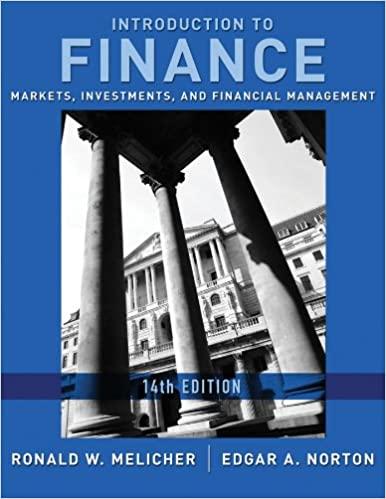
Marston Marble Corporation is considering a merger with the Conroy Concrete Company. Conroy is a publicly traded company, and its beta is 1.35. Conroy has been barely profitable, so it has paid an average of only 30% in taxes during the last several years. In addition, it uses little debt; its target ratio is just 20%, with the cost of debt 9%. If the acquisition were made, Marston would operate Conroy as a separate, wholly owned subsidiary. Marston would pay taxes on a consolidated basis, and the tax rate would therefore increase to 40%. Marston also would increase the debt capitalization in the Conroy subsidiary to wd = 45%, for a total of $17.96 million in debt by the end of Year 4, and pay 10.0% on the debt. Marston's acquisition department estimates that Conroy, if acquired, would generate the following free cash flows and interest expenses (in millions of dollars) in Years 1-5: Year Free Cash Flows Interest Expense 1 $1.30 $1.2 2 1.50 1.7 3 1.75 2.8 2 4 2.00 2.1 5 2.12 In Year 5, Conroy's interest expense would be based on its beginning-of-year (that is, the end-of-Year-4) debt, and in subsequent years both interest expense and free cash flows are projected to grow at a rate of 7%. These cash flows include all acquisition effects. Marston's cost of equity is 10.6%, its beta is 1.2, and its cost of debt is 9.5%. The risk-free rate is 7%, and the market risk premium is 3.0%. Use the compressed APV model to answer the following questions. a. What is the value of Conroy's unlevered operations? Do not round intermediate calculations. Enter your answer in millions. For example, an answer of $1.2 million should be entered as 1.2, not 1,200,000. Round your answer to two decimal places. million What is the value of Conroy's tax shields under the proposed merger and financing arrangements? Do not round intermediate calculations. Enter your answer in millions. For example, an answer of $1.2 million should be entered as 1.2, not 1,200,000. Round your answer to two decimal places. Do not round intermediate calculations. million b. What is the dollar value of Conroy's operations? Enter your answer in millions. For example, an answer of $1.2 million should be entered as 1.2, not 1,200,000. Round your answer to two decimal places. million If Conroy has $10 million in debt outstanding, how much would Marston be willing to pay for Conroy? Enter your answer in millions. For example, an answer of $1.2 million should be entered as 1.2, not 1,200,000. Round your answer to two decimal places. Do not round intermediate calculations. million Marston Marble Corporation is considering a merger with the Conroy Concrete Company. Conroy is a publicly traded company, and its beta is 1.35. Conroy has been barely profitable, so it has paid an average of only 30% in taxes during the last several years. In addition, it uses little debt; its target ratio is just 20%, with the cost of debt 9%. If the acquisition were made, Marston would operate Conroy as a separate, wholly owned subsidiary. Marston would pay taxes on a consolidated basis, and the tax rate would therefore increase to 40%. Marston also would increase the debt capitalization in the Conroy subsidiary to wd = 45%, for a total of $17.96 million in debt by the end of Year 4, and pay 10.0% on the debt. Marston's acquisition department estimates that Conroy, if acquired, would generate the following free cash flows and interest expenses (in millions of dollars) in Years 1-5: Year Free Cash Flows Interest Expense 1 $1.30 $1.2 2 1.50 1.7 3 1.75 2.8 2 4 2.00 2.1 5 2.12 In Year 5, Conroy's interest expense would be based on its beginning-of-year (that is, the end-of-Year-4) debt, and in subsequent years both interest expense and free cash flows are projected to grow at a rate of 7%. These cash flows include all acquisition effects. Marston's cost of equity is 10.6%, its beta is 1.2, and its cost of debt is 9.5%. The risk-free rate is 7%, and the market risk premium is 3.0%. Use the compressed APV model to answer the following questions. a. What is the value of Conroy's unlevered operations? Do not round intermediate calculations. Enter your answer in millions. For example, an answer of $1.2 million should be entered as 1.2, not 1,200,000. Round your answer to two decimal places. million What is the value of Conroy's tax shields under the proposed merger and financing arrangements? Do not round intermediate calculations. Enter your answer in millions. For example, an answer of $1.2 million should be entered as 1.2, not 1,200,000. Round your answer to two decimal places. Do not round intermediate calculations. million b. What is the dollar value of Conroy's operations? Enter your answer in millions. For example, an answer of $1.2 million should be entered as 1.2, not 1,200,000. Round your answer to two decimal places. million If Conroy has $10 million in debt outstanding, how much would Marston be willing to pay for Conroy? Enter your answer in millions. For example, an answer of $1.2 million should be entered as 1.2, not 1,200,000. Round your answer to two decimal places. Do not round intermediate calculations. million







